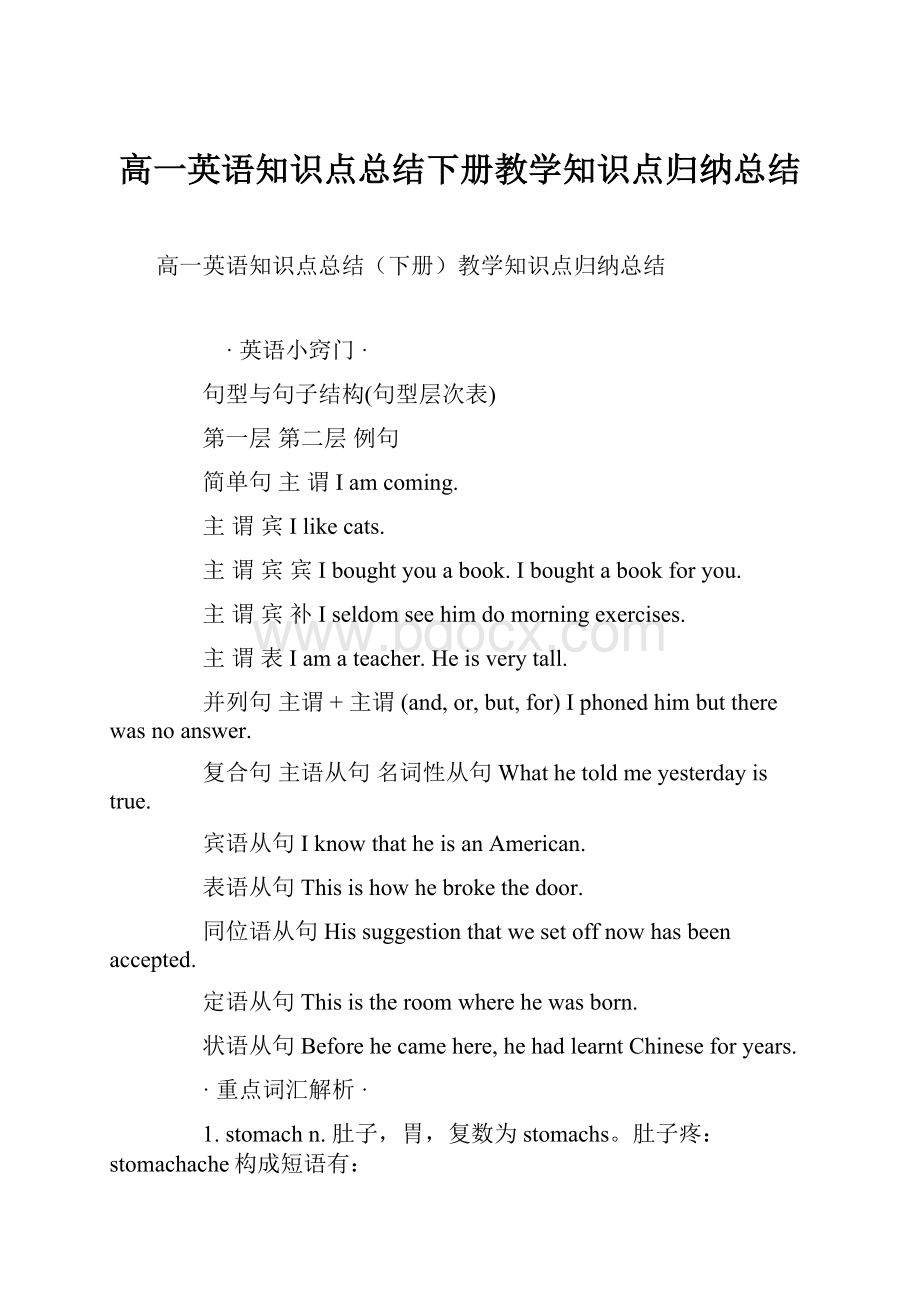高一英语知识点总结下册教学知识点归纳总结.docx
《高一英语知识点总结下册教学知识点归纳总结.docx》由会员分享,可在线阅读,更多相关《高一英语知识点总结下册教学知识点归纳总结.docx(45页珍藏版)》请在冰豆网上搜索。

高一英语知识点总结下册教学知识点归纳总结
高一英语知识点总结(下册)教学知识点归纳总结
·英语小窍门·
句型与句子结构(句型层次表)
第一层第二层例句
简单句主谓Iamcoming.
主谓宾Ilikecats.
主谓宾宾Iboughtyouabook.Iboughtabookforyou.
主谓宾补Iseldomseehimdomorningexercises.
主谓表Iamateacher.Heisverytall.
并列句主谓+主谓(and,or,but,for)Iphonedhimbuttherewasnoanswer.
复合句主语从句名词性从句Whathetoldmeyesterdayistrue.
宾语从句IknowthatheisanAmerican.
表语从句Thisishowhebrokethedoor.
同位语从句Hissuggestionthatwesetoffnowhasbeenaccepted.
定语从句Thisistheroomwherehewasborn.
状语从句Beforehecamehere,hehadlearntChineseforyears.
·重点词汇解析·
1.stomachn.肚子,胃,复数为stomachs。
肚子疼:
stomachache构成短语有:
haveapaininthestomach胃(腹)疼
lieonone’sstomach俯卧
havethestomachfor…对……有兴趣
turnone’sstomach使……恶心
onanempty/afullstomach空着肚子/吃饱
2.barn.
(1)条状物;棒
abarofsoap一条肥皂abarofchocolate一条巧克力abarofgold一根金条
(2)酒吧acoffeebar
(3)固定短语:
behindbars在狱中
3.dietn.
(1)正常饮食abalanceddiet均衡的饮食adietofpotatoes土豆食品
(2)饮食限制goonadiet=beonadiet节食,节食
Nosugarinmycoffee;I’mdieting.
4.diseasen.疾病aseriousdiseaseoftheliver严重的肝病
diseasedadj.有病的adiseasedplant病态的植物
辨析:
illness,disease
illness:
很少指具体疾病,只表示抽象的疾病和生病的状态。
disease:
指可以染上和传染他人的疾病。
e.g.Severalchildrenareawayfromschoolbecauseofillness.几个孩子因生病没上学。
Hehasarareheartdisease.他得了一种罕见的心脏病。
5.probably与possibly比较
(1)probably极有可能,有几分根据的猜测;比possibly所指的可能性大些。
e.g.Heisworkinghardandcleveraswellmanypeoplecanhelphim.Hewillprobablywin.他工作努力,人也聪明;很多人愿意帮助他。
他极有可能取胜。
(2)possibly可能地。
表示客观上潜在的可能性,可能性比probably小,经常与情态动词can或may连用。
e.g.Shemaypossiblybethegreatestwriterofhergeneration.
她或许是她那一代人中最伟大的作家。
6.promisev.&n.允诺;答应
动词用法:
后接名词或代词、不定式、that从句
(1)Theypromisedanimmediatereply.他们答应立刻回复。
(2)Hepromisedmetobehereatsixo’clock.=Hepromisedmethathewouldbehereatsixo’clock..他答应我他将在六点在这里等我。
(3)Ipromisedyounottosaythat.我答应你不说那件事。
(4)Itpromisestobewarmthisafternoon.今天下午有望转暖。
(5)Heisapromisingboy.他是一个有前途的男孩。
名词用法:
makeapromise许下诺言giveapromise许下诺言
keepapromise信守诺言carryoutapromise履行诺言
breakapromise违背诺言
7.brainn.
(1)用作不可数名词,大脑
Thebrainisthecentreofhighernervousactivity.大脑是高等神经活动的中枢。
(2)用作可数名词brains,智力,头脑
Shehasagoodbrain.=Shehasgoodbrains.她很聪明。
8.advise,suggest用法
(1)advisesb.todosth.建议某人做某事advisedoingsth.建议做某事。
advisethat…(should)+动词原形
Iadviseyoutoleavenow.我建议你现在就离开。
Iadvisewaitingtillthepropertime.我建议等到适当时机(才行动)。
Weadvisethatsteps(should)betakenatonce.我们建议立即采取措施。
(2)suggest建议,其句型为
suggestdoingsth.建议做某事
suggestone’sdoingsth.=suggestsb.doing建议某人去做某事
suggestthat…(should)+动词原形
Wesuggestedthattheoldmuseum(should)berebuiltassoonaspossible.
我们建议那座旧博物馆应该尽早重修。
9.diet与food的区别:
diet指的是习惯的食物或规定的食物,特指维持健康的定量或定质的食物。
food指能吃喝的具有营养的东西。
例如:
Thedoctorhasorderedmeaspecialdiet.医生给我安排了特殊的饮食。
Ilikeasimpledietbest.我最喜欢粗茶淡饭。
Wemusthavefoodtoeatandclothestowear.我们必须有食物吃,有衣服穿。
Thepatientmustnotgowithoutfood,buthemusthaveadietwithoutsugar.
这个病人不可不吃东西,但要吃不含糖的饮食。
·重点词组解析·
1.plentyof充分的,大量的,既可修可数名词又可修不可数名词,只用于陈述句,
在疑问句中一般用enough,在否定句中用many或much。
注意:
plentyof前面没有冠词a,不可误记成aplentyof。
Makesurethereisplentyoffoodforeveryone.Wehaveplentyofchairshere.
inplenty充足地
Thereisfoodinplenty.=Thereisplentyoffood.
2.becareful用法归纳
(1)becareful单独使用,当心
Becareful!
Thepanishot!
当心!
锅很热。
(2)becarefulabout…对……谨慎
Ihopeyou’llbecarefulinfutureaboutthethingsyousay.我希望你将来对所说事谨慎。
(3)becarefulof…留神……
Wehavetobecarefulofwhattheyaredoing.我们得留神他们做的什么。
(4)becarefulwith…注意……
Youmustbemorecarefulwithyourwork.你们需注意你们的工作。
有时becareful表示吝啬。
He’stoocarefulwithhismoney;heneverbuysadrinkforanyone.
他太吝啬了,他从不给别人买杯水。
(5)becarefulnottodosth.小心不要做……
Wewanttobecarefulnottobreakanything.我们要小心不要打破任何东西。
(6)becareful+从句加以小心
Becarefulwhatyoudo.小心你做的一切。
3.keepupwith跟上(防止落后)
keepupwiththeclass跟上班级(不掉队)
keepupwiththedevelopmentofsociety适应社会的发展
keepupwiththegoingon跟上时尚
注意:
catchupwith(已经落后)赶上
4.Be+adj+to短语
(1)beharmfulto…对……有害
be+adj.+tosb./sth.指对某人或某物有……影响或态度如何。
begoodto…=bekindto…对……态度好
befriendlyto…对……友好
becruelto…对……凶残
bebadto…对……态度不好
bepolite/impoliteto…对……有礼貌/无礼貌
berudeto…对……粗鲁
5.cut短语总结:
(1)cutinto…把……切成
Vegetablesshouldbecutintosmallpiecesanddroppedintotheboilingwater.
蔬菜应切成小碎块放进开水里。
(2)cutup切碎
Momiscuttingupthemeattomakedumplings.妈妈正剁肉准备包饺子。
(3)cutdown砍倒;削减
Ifyoucutdownthetrees,youwillruintheland.如果你砍伐树木,就会毁坏土地。
Ihavedecidedtocutdownmysmoking.我决定戒烟。
(4)cutoff切断,停掉
Ourwatersupplyhasbeencutoffagain.我们的供水再次中断。
6.Short短语
(1)beshortof缺少
I’mshortofmoneythisweek,canyoulendmesome?
这星期我缺钱,你能借我一点?
(2)runshort几乎用光
We’verunshortofoil.我们已经用光油了。
Thesupplyofoilisrunningshort.供应的油快要用光了。
·重点句型解析·
1.Itwasabitgreen.它还有点生。
1)句中的green意为“没有成熟的”,是ripe的反义词。
例如:
Wedon¢tliketoeatgreenfruit./Theapplesarestilltoogreentopick.
2)abit作程度副词,与alittle同义。
例如:
I¢mabit/alittletired./Couldyoudriveabit/alittleslower?
3)但是,notabit=notatall,而notalittle=very/much.例如:
I¢mnotabittired.我一点不累I¢mnotalittletired.我很累。
2.Whileyouareatschool,orwalkinghome,yourbodyisburningup100caloriesanhour.你在学校上课或步行回家时,你体内每小时消耗100卡。
1)burnup意为“烧掉”、“烧毁”,在本句中意为“消耗掉”。
例如:
Heburnedupalltheoldletters.他把过去的全部信件都烧掉了。
Thehouseburnedupbeforetheygotthere.他们到达那儿之前,房子已烧毁了。
2)up与一些动词构成短语时,有“完结”、“终结”的意思。
如eatup吃光,drinkup喝光,tearup撕碎,useup用完,lockup锁好。
3.Eatinghabitsbecomepartofwhoweare.饮食习惯变成我们自身的一部分。
whoweare为介词of的宾语从句。
eatinghabits为动名词短语作句子的主语。
动名词或不定式(短语)作主语时,谓语动词一般用单数。
Seeingisbelieving.眼见为实partof………的一部分
Partofthebuildingwasdestroyedinthefire.大楼的一部分被火烧毁了。
apartof指不足一半,意为“一小部分”。
WespentapartofourholidayinFrance.我们的一部分假期是在法国度过的。
4.TheChineseeatlesssugarthanmanyothercountriesintheworld.中国人吃的糖比世界上其它许多国家的人都少。
1)theChinese指(全体)中国人。
以-ese结尾的表示国籍的词与定冠词连用时,表示整个国家的人。
例如:
theJapanese(全体)日本人,theVietnamese(全体)越南人。
但指该国单个的人时,则是aChinese,aJapanese,aVietnamese.
5.Theyeatalotofsugarintheformofcakes,softdrinks,sweetsandsoon.他们吃蛋糕、软饮料、糖果等,其中含有大量的糖。
1)intheformof意为“以……的形式”。
例如:
Hemadethesuggestionintheformofaquestion.他以提问题的形式提出建议。
Heexpressedhisfeelingsintheformofletters.他用写信来表达自己的感情。
Hewroteanovelintheformofadiary.他以日记的形式写了一本小说。
6.InsomepartsofBritain,onepersoninten,bytheageofthirty,hasnoteethleft!
在英国有些地方,十分之一的人年方三十,牙齿就都脱光了!
1)onepersoninten是“十个中有一个”的意思,也可说成onepersonoutoften。
例如:
Oneineveryfourchildrenhadbadteeth./Nineintenpeopleagreedwithus./
2)bytheageof意“……岁之前”“到……岁时”,attheageof意“在……岁时
Shehadlearnedtoplaythepianobytheageoften.十岁之前,他就学会弹钢琴。
Hediedattheageof90.他九十岁去世。
7.Scoresofpeoplewentthereinthefirstfewdaysafteritsopening.开张后的头几天,许多人到那家餐馆去吃饭。
1)score作“二十”解,和数字连用时,不可加s,如ascoreofeggs(20个蛋),fourscoreandsevenyearsago(87年前)。
但scoresof则为固定词组,意为“许多”。
例如:
Ascoreormoreattendedthemeeting.20多人出席会议。
Ihavebeentherescoresoftimes.我到那儿去过多次了。
2)first后面跟复数名词时,意为“头几个”、“头一批”。
例如:
Forthefirstfewweeks,theydidn¢ttalktoeachother.头几个星期,他们彼此不曾讲过话。
HewasoneofthefirstpeopletodiscoverAmerica.他是首批发现美洲的人之一。
·语法精讲·
情态动词hadbetter,should及oughtto的用法
(1)hadbetter最好
①加动词原形
You’dbettergetsomesleep.你最好睡一会儿。
I’dbetternotdisturbhim.我最好不打扰他了。
②后接bedoingsth.表示最好立即做某事
IthinkI’dbetterbegoing.我想我最好立刻走。
③祈使句中had省略
Betternotwaitforthem.最好不等他们。
④反义疑问句用had
You’dbetterputawayyoursocks,hadn’tyou?
你最好把你袜子收拾好,难道不行吗?
Youhadbetternotfollowher,hadyou?
你最好不要跟她,不是吗?
(2)should与oughtto应该
①oughtto的口气比should稍重一些,更侧重于某件事责任、义务上该做的事情。
should表示某件事宜于做。
下列句子两个词不宜换用:
Youarehisfather.Yououghttotakecareofhim.你是他的父亲,就应该照顾他。
Weshouldnotusetoomanybigwordsinoureverydayspeech.
我们不应该说太多的大话在我们的日常讲话中。
②oughtto的句式变化
否定句:
Yououghtnot=(oughtn’t)towritesocarelessly.你不该写得这样粗心。
疑问句:
Oughtwetogivehimachancetotry?
我们该给他机会试一试?
③与完成时连用
should/oughttohavedonesth.本应该做……(而实际没做)
Weoughttohavefinishedourhomeworkontime.我们本应该按时完成作业。
shouldn’t/oughtn’ttohavedonesth.本不应该做……(而实际做了)
Theyoughtn’ttohavecomebacksolate.他们本不该回来这样晚。
·同步练习·
1.Four______ofstudentstookpartinthesportsmeeting.
A.hundredB.hurdredsC.scoreD.scores
2.Hemadethesuggestion________theformofaquestion.
A.withB.byC.onD.in
3.——YourEnglishisverygood.——__________
A.Thankyou.I¢mgladyouthinkso.B.No,myEnglishisverypoor.
C.Isthattrue?
D.Don¢tyouthinkso?
4.Ourhomeisalways_______loveandunderstanding.
A.richforB.richinC.highwithD.highby
5.Ihopeyou¢llforgetalltheunhappinessIhave_____you.
A.causedB.givenC.offeredD.handed
6.——Whydon¢twegoandplayfootball?
——___________.
A.Yes,IthinksoB.Icanplayfootball
C.It¢sagoodgameD.That¢sagoodidea
7.Whatisthematter_______thetape-recorder?
A.aboutB.forC.fromD.with
8.You_____better________thethingtobedone.
A.had;nottocauseB.had;notcause
C.hadn¢t;causeD.hadn¢t;causing
9.Thedoctoradvisesthatthepatient_______moreexercis